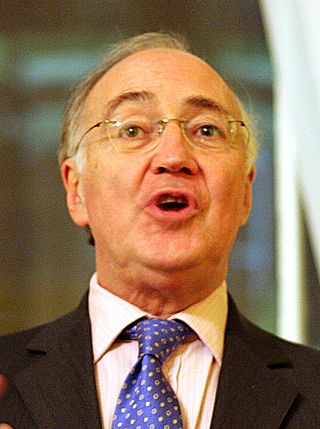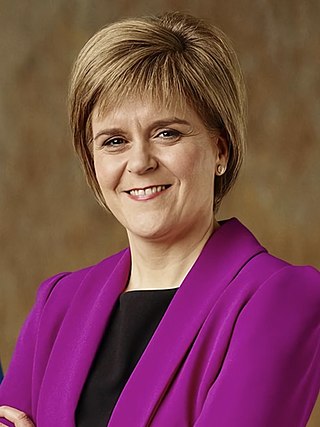
The 2001 United Kingdom general election was held on Thursday 7 June 2001, four years after the previous election on 1 May 1997, to elect 659 members to the House of Commons. The governing Labour Party led by the prime minister Tony Blair was re-elected to serve a second term in government with another landslide victory with a 167-seat majority, returning 412 members of Parliament versus 418 from the 1997 general election, a net loss of six seats, though with a significantly lower turnout than before—59.4%, compared to 71.6% at the previous election.

Warrington South is a constituency represented in the House of Commons of the UK Parliament since 2019 by Andy Carter, a Conservative Party politician.

Sheffield Hallam is a constituency represented in the House of Commons of the UK Parliament since 2019 by Olivia Blake of the Labour Party.

The 1950 United Kingdom general election was the first to be held after a full term of a majority Labour government. The general election was held on Thursday 23 February 1950, and was also the first to be held following the abolition of plural voting and university constituencies. The government's lead over the Conservative Party shrank dramatically, and Labour was returned to power but with an overall majority significantly reduced from 146 to just 5. There was a 2.8% national swing towards the Conservatives, who gained 90 seats. Labour called another general election the following year, which the Conservative Party won, returning Churchill to government after six years in opposition.
A safe seat is an electoral district (constituency) in a legislative body which is regarded as fully secure, for either a certain political party, or the incumbent representative personally or a combination of both. With such seats, there is very little chance of a seat changing hands because of the political leanings of the electorate in the constituency concerned or the popularity of the incumbent member. The opposite type of seat is a marginal seat. The phrase "tantamount to election" is often used to describe winning the dominant party's nomination for a safe seat.

North East Fife is a county constituency in Fife, Scotland, represented in the House of Commons of the UK Parliament by Wendy Chamberlain of the Liberal Democrats since the 2019 general election.

Westmorland and Lonsdale is a constituency in the south of Cumbria, represented in the House of Commons of the UK Parliament since 2005 by Tim Farron, the former leader of the Liberal Democrats (2015–2017).

Southport is a constituency in Merseyside which has been represented in the House of Commons of the UK Parliament since 2017 by Damien Moore of the Conservative Party.

The 2005 United Kingdom local elections were held on Thursday 5 May 2005, with various councils and local government seats being contested in England and Northern Ireland, and a local referendum taking place on the Isle of Wight on the issue of a directly elected mayor. These local elections were held in conjunction with the 2005 general election across the entire United Kingdom.

The 2005 United Kingdom general election was held on Thursday 5 May 2005, to elect 646 members to the House of Commons. The governing Labour Party led by the prime minister Tony Blair won its third consecutive victory, with Blair becoming the second Labour leader after Harold Wilson to form three majority governments. However, its majority fell to 66 seats; the majority it won four years earlier had been of 167 seats. This was the first time the Labour Party had won a third consecutive election. The Liberal Democrats won seats for the third time in a row, and scored the highest Liberal seat number since World War II. As of the 2024 general election this is the last Labour victory in a general election.

The 2010 United Kingdom general election was held on Thursday 6 May 2010, to elect Members of Parliament to the House of Commons. The election took place in 650 constituencies across the United Kingdom under the first-past-the-post system. The election resulted in a large swing to the opposition Conservative Party led by David Cameron similar to that seen in 1979, the last time a Conservative opposition had ousted a Labour government. The governing Labour Party led by the prime minister Gordon Brown lost the 66-seat majority it had previously enjoyed, but no party achieved the 326 seats needed for a majority. The Conservatives won the most votes and seats, but still fell 20 seats short. This resulted in a hung parliament where no party was able to command a majority in the House of Commons. This was only the second general election since the Second World War to return a hung parliament, the first being the February 1974 election. This election marked the start of Conservative government for the next 14 years.

Penistone and Stocksbridge is a constituency in South Yorkshire represented in the House of Commons of the UK Parliament since 2019 by Miriam Cates, a Conservative. As with all Westminster constituencies, adults qualifying to vote in the seat elect one Member of Parliament (MP) by the first past the post system at least every five years.

An election to the Assembly of London took place on 1 May 2008, along with the 2008 London mayoral election. The Conservatives gained 2 seats, Labour gained one seat, the Liberal Democrats lost two seats, and UKIP were wiped out. Notably, a candidate for the British National Party (BNP) was elected for the first time.
This is the results breakdown of the 2005 general election.

A general election was held in the United Kingdom on 5 May 2005 and all 59 seats in Scotland were contested. This was the first election to occur under the new boundaries which reduced the number of Scottish seats from 72 to 59. Previously, Scotland had a greater number of MPs per person than the rest of the UK to compensate for its distinct political nature and distance from Westminster. With the introduction of the Scottish Parliament, Scottish constituencies were brought into line with those found in the rest of the UK, so that they had similar electorates.

The 2015 United Kingdom general election was held on Thursday 7 May 2015 to elect 650 Members of Parliament to the House of Commons. It was the only general election held under the rules of the Fixed-term Parliaments Act 2011 and was the last general election to be held before the United Kingdom would vote to end its membership of the European Union (EU). Local elections took place in most areas of England on the same day. The governing Conservative Party led by the prime minister David Cameron won an unexpected victory; opinion polls and political commentators had predicted that the results of the election would cause a second consecutive hung parliament whose composition would be similar to the previous Parliament, which was in effect from the previous national election in 2010. Opinion polls turned out to have underestimated the Conservatives, however, as they won 330 of the 650 seats and 36.9% of the votes, giving them a majority of ten seats.

A general election was held in the United Kingdom on 7 May 2015 and all 59 seats in Scotland were contested under the first-past-the-post, single-member district electoral system. Unlike the 2010 general election, where no seats changed party, the Scottish National Party (SNP) won all but three seats in Scotland in an unprecedented landslide victory, gaining a total of 56 seats. The SNP received what remains the largest number of votes gained by a single political party in a United Kingdom general election in Scotland in British history, breaking the previous record set by the Labour Party in 1964 and taking the largest share of the Scottish vote in sixty years, at approximately 50 per cent.
This is a list of marginal seats in the United Kingdom after the results in the 2010 General Election.

The 2019 United Kingdom general election was held on Thursday 12 December 2019, with 47,567,752 registered voters entitled to vote to elect members of the House of Commons. The governing Conservative Party led by the prime minister Boris Johnson won a landslide victory with a majority of 80 seats, a net gain of 48, on 43.6% of the popular vote, the highest percentage for any party since the 1979 general election, though with a narrower popular vote margin than that achieved by Labour over the Conservatives in 1997. This was the second national election to be held in 2019 in the United Kingdom, the first being the 2019 European Parliament election.

A general election was held in the United Kingdom on Thursday 8 June 2017; all 59 seats in Scotland were contested under the first-past-the-post electoral system.